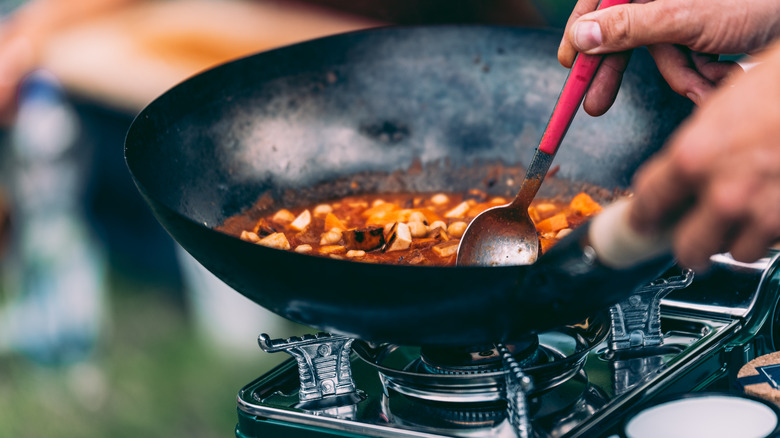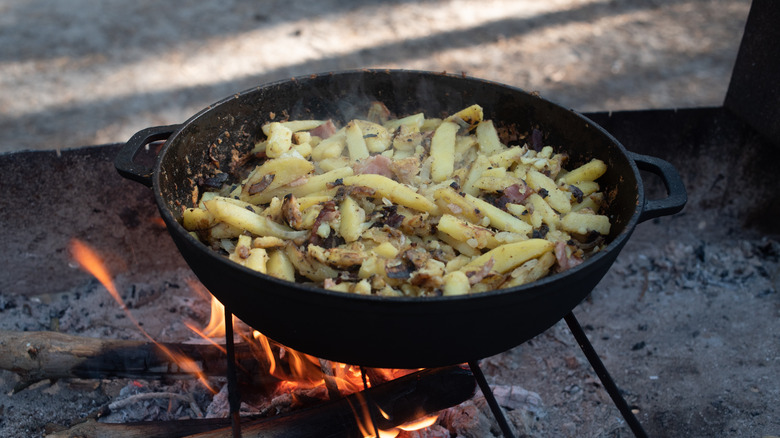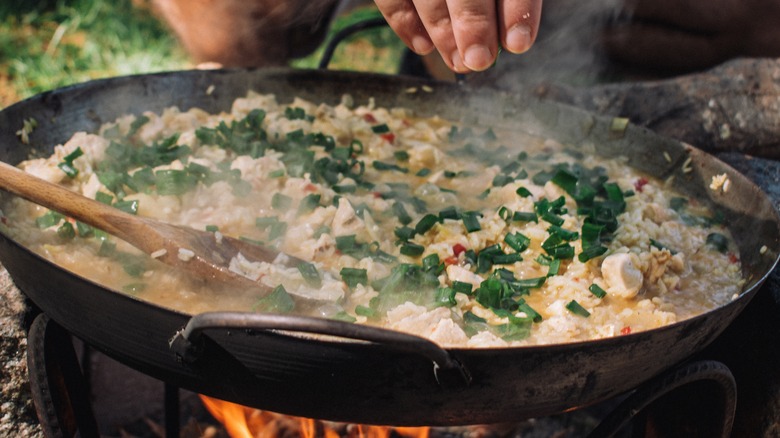Ditch The Cast Iron Skillet For A Wok When Cooking By The Campfire
Arguably, the best part of camping is sitting around the campfire and enjoying a meal with loved ones. Whether you drove to the site or hiked miles, it's essential to pack the right tools to enjoy the experience fully. While cast iron is great for campfire cooking, a wok may be a better option.
For likely over 2,000 years, woks have been used by the Chinese and other cultures to prepare meals over an open flame. Their bowl-shaped design enables flames to climb the pan's sides to sear food quickly. Unlike a flat, cast iron skillet, woks have tall, angular sides that allow you to cook a lot of food at once. The flexible design means you can use a small amount of oil to scramble a single egg or more to deep-fry whole fish that you've freshly caught. Their high walls create zones for direct and indirect cooking, like a grill, making it the only pan you need to bring on the trip.
Various metals are used to manufacture the pans, but carbon steel is the best choice for camping for several reasons. Like cast iron, carbon steel is naturally nonstick and conducts heat well but gets hot more quickly, so there's less waiting. Compared to cast iron, carbon steel is lighter, which is a critical factor when hiking with a heavy pack to the camp. With multiple design options, the versatile pan can be used seamlessly between indoor and campsite cooking, preparing much more than stir-fry.
The best wok for campsite cooking
When cooking with a wok at a campsite, familiarize yourself with the cooking surface since pans are manufactured with flat and round bottoms in various diameters. Whether a grill grate, tripod, open fire, or spit is available determines the best wok style for the trip. Round bottom pans work well on a tripod, enabling you to sear food faster than a flat bottom. However, when cooking on a flat surface, a wok ring is required to prevent it from tipping.
Wide, flat bottom woks provide the most stability, enabling you to use the pan on all types of cooking surfaces and in the oven. Small-diameter bottoms are efficient when cooking on residential burners, but if you plan on searing large cuts of meat or flipping pancakes at the campsite, select a wok that's eight inches or larger for the greatest versatility. Since metal utensils are essential when cooking with an open flame, choose a wok with gentle sloping sides to avoid damaging its corners.
Additionally, if you're cooking with an open flame or plan on using the pan in the oven, avoid a wooden handle that will burn, or purchase a wok with a detachable handle (which also makes packing a cinch). Carbon steel woks are as durable as cast iron skillets and can handle temperatures up to 1,200 degrees Fahrenheit, making them ideal for sauteeing or searing. However, their large surface area allows you to steam, boil, and fry, too.
Try these dishes at your next campfire
Traditionally, woks were designed to be tossed, imparting a smoky taste and developing caramelization, known as wok hei flavor. However, the pans are not limited to stir-frying. Instead of lifting the pan, you can park it over the heat source and use a long spatula to move the food around for even cooking. Aside from high-acid food like tomato sauce, which strips away the seasoning, wide, flat-bottom woks enable you to prepare everything from hot dogs to spaghetti at your campsite.
Prepare meal kits at home in resealable baggies to simplify campsite cooking. Dice onions, peppers, and mushrooms to make breakfast burritos or omelets in the morning. The seasoned surface means that eggs won't stick, but a few strips of bacon won't hurt either. Despite the angled sides, the bottom of the wok can be used to prepare perfect pancakes or hamburgers later in the day.
Utilize the tall sides to quickly saute ingredients for Oaxacan pork fajitas, or lower the heat and simmer some soup on a chilly day. The deep walls allow you to boil pasta or prepare rice dishes like arroz abanda without having to pack a Dutch oven. When cleaning up, the pan doubles as a wash basin. Just remember to thoroughly dry it before storing it to prevent rust. When camping, everything you prepare in a cast iron skillet, plus more, can be made with a wok.



